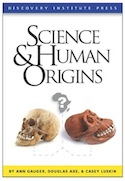 Evolution
Evolution
We Called Out Darwinist Critic Carl Zimmer, He Folded, and Now He’s a Darwinist Hero
 Could it get any more surreal than this? You may recall that after our new book Science and Human Origins came out, the Internet’s Darwin brigade rallied around a previously unknown New Zealand grad student who reviewed the book on his personal website. The basic approach was: We don’t have to answer the arguments posed by this book because Paul McBride (Who dat?) has already done so.
Could it get any more surreal than this? You may recall that after our new book Science and Human Origins came out, the Internet’s Darwin brigade rallied around a previously unknown New Zealand grad student who reviewed the book on his personal website. The basic approach was: We don’t have to answer the arguments posed by this book because Paul McBride (Who dat?) has already done so.
McBride was so obscure that one of those to hoist him up on their shoulders, science writer and Discover magazine blogger Carl Zimmer, kept spelling his name “MacBride.”
In case you haven’t been following this peculiar debate, the hero’s mantle has now passed from McBride/MacBride to Carl Zimmer himself. Mr. Zimmer is currently the toast of the Internet Darwinist illuminati with, for example, Jack Scanlan falling into ecstasies: “Carl Zimmer has wasted no time tearing the argument in the book apart. It’s glorious. I highly recommend reading it all.”
He was referring to Zimmer’s four-part review — not, however, a review of the book but of my brief blog post here summarizing Casey Luskin’s Chapter 4, half of which deals with one argument that’s offered for human/ape common ancestry: the argument from human chromosome 2. I had quoted, even more briefly, from Casey’s chapter. This became fodder for endless words spilled by Zimmer and others on Biologic Institute’s Facebook page and later in the series of posts on Zimmer’s Discover blog, the latter adding up to more than 7000 words.
Zimmer’s series is a masterpiece in a way — a masterpiece of misdirection. I wrote that post simply to acquaint readers here with a bit of the content, which is all strong and provocative, in one chapter of Science and Human Origins. Zimmer proceeded to focus on one small point, far from being the capstone of the book’s overall argument in favor of skepticism regarding Darwinian accounts of human origins, to the absolute exclusion of everything else in the book.
The chromosome-2 angle is so distant from being at the heart of the topic that, as Casey said here the other day, he’s already written previously that “good evidence” points to a fusion event which, however, leads to no particular conclusion on common ancestry.
Zimmer refused to read the book, refused even the offer of a free copy. Refused to debate us here at ENV. He seemed to have plenty of free time on his hands — to produce what amounts to a 7000-word essay responding to a paragraph (less than 100 words) in a blog post — but no time to respond in any way to the overall case made in the book.
What he calls his final post in the series is likewise a masterpiece in the sense that it continues to keep his readers distracted from the many other sides of the question that gives this subject the charge and interest that it possesses for all of us, Darwin faithful and skeptics alike: the enigma of human origins. If the chromosome-2 question did not potentially bear on that, we wouldn’t be discussing it at all now.
The slender point of contention is this: Casey quoted a 2002 article in Genome Research that expressed surprise at the condition of interstitial telomeric DNA in human chromosome 2, compared to what you’d expect if the chromosome reflects a fusion event that in turn gives evidence of human/ape common descent. Zimmer replies by saying that the condition of the telomeric DNA is in fact just what you’d expect.
With Darwinists, you should always expect the unexpected. Surprises in the evidence, that seem to go against the preferred evolutionary narrative, are invariably recast as just what you’d expect. Zimmer uses the word, “expect,” five times in his final post.
Meanwhile Casey has responded in detail to Zimmer’s critique of his use of the 2002 paper, but Zimmer has as yet ignored this too.
All of which serves no purpose other than to deflect attention from Zimmer & Co.’s flat failure to enter into a reasoned discussion of the evidence as a whole, for or against Darwinian accounts of human origins. As we’ve often said here before, if they could answer us properly, they would have done so by now.
